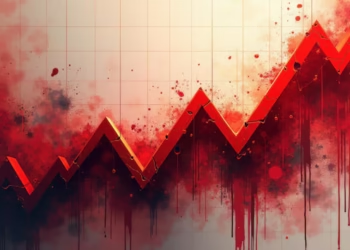The Ghana Stock Exchange (GSE) witnessed a significant decline in trading activity at the end of Thursday’s session, with market volume and turnover dropping by an alarming 97% compared to the previous day.
According to official data, a total of 268,624 shares, corresponding to a market value of GHS 1,022,561.81, were traded across 19 listed equities — signaling a cooling-off period after days of active market engagement.
The sharp contraction in trading activity has raised eyebrows among market watchers who attribute the dip to investor caution amid mixed market signals. Thursday’s results marked one of the steepest single-day drops in trading volume on the GSE in recent weeks.
While most stocks saw limited movement, CalBank emerged as the most actively traded equity, recording 110,929 shares. However, the day proved unfavorable for the bank’s investors as the stock price tumbled by 10%, making it the day’s sole loser.
Other key equities included MTN Ghana, which traded 72,491 shares, Fan Milk with 43,468 shares, and GCB Bank with 12,246 shares. Despite the overall decline in trading activity, GCB Bank managed a modest gain of 0.12%, while Ghana Oil Company (GOIL) stood out with a 2.35% rise, signaling some investor confidence in select blue-chip stocks.
Market Indices Reflect Mild Declines
The benchmark GSE Composite Index (GSE-CI) dipped slightly by 3.14 points (-0.04%), closing at 8,341.87 points. This represented a 1-week loss of 0.44% and a 4-week loss of 0.29%, though the index continues to boast an impressive year-to-date gain of 70.64% — one of the strongest performances in the sub-region.
Similarly, the GSE Financial Stocks Index (GSE-FSI) edged down 0.17% to 4,132.90 points, yet it posted a 1-week gain of 1.19%, a 4-week gain of 7.38%, and an exceptional year-to-date growth of 73.59%. Analysts believe these figures underscore the resilience of Ghana’s financial stocks despite short-term volatility.
The day’s bearish sentiment also impacted the GSE’s total market capitalization, which declined by GHS 1 million to settle at GHS 166.1 billion. While this represents a marginal drop, it highlights the subdued investor sentiment that characterized Thursday’s trading session.
Market observers suggest that institutional investors may have shifted to a wait-and-see approach amid evolving macroeconomic conditions, including interest rate adjustments and policy developments affecting liquidity.
Analysts Urge Calm Amid Market Cool-Off
Market analysts have downplayed fears of a sustained downturn, noting that such fluctuations are typical in a high-performing market nearing year-end. They argue that the 97% decline in trading activity may simply reflect investor repositioning after strong gains earlier in the year.
“The slowdown doesn’t necessarily signal panic. We are seeing profit-taking and short-term corrections after an impressive run in the GSE Composite Index,” one market analyst explained.
Despite the day’s downturn, investor confidence in Ghana’s equity market remains largely positive, backed by robust corporate earnings and strong macroeconomic fundamentals.
Experts project that market activity could rebound in the coming weeks as investors re-enter the market to take advantage of attractive stock valuations, particularly in the financial and oil marketing sectors.
The GSE’s impressive year-to-date growth of over 70% continues to make it one of Africa’s top-performing stock markets. However, analysts warn that maintaining this momentum will depend on consistent macroeconomic stability and investor-friendly policies.
In the short term, traders are expected to remain cautious, focusing on companies with strong fundamentals and dividend potential as they navigate market corrections.
READ ALSO:IMANI Boss Urges Renegotiations Between Health Minister and LHIMS























